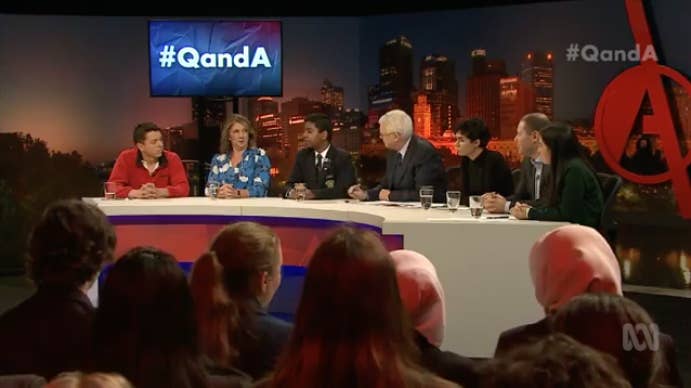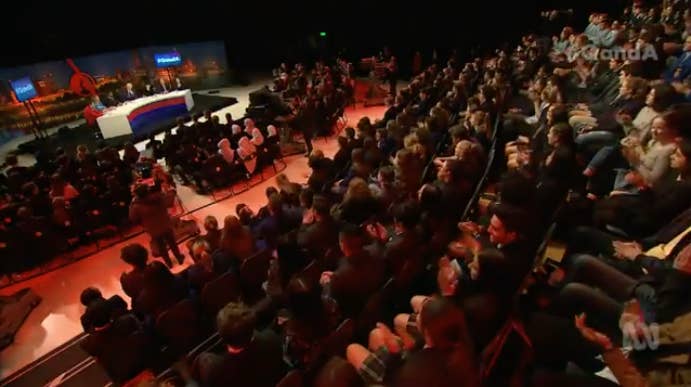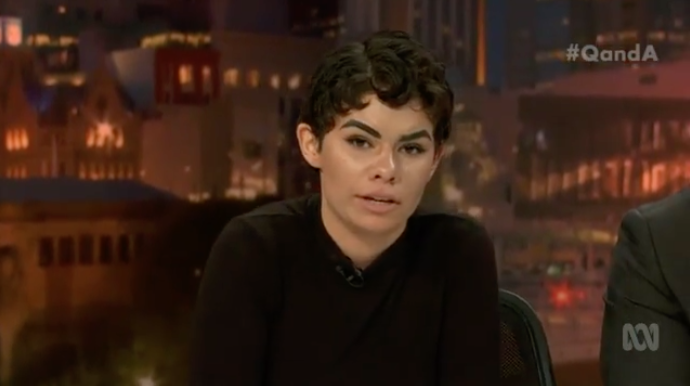
The ABC panel show Q&A had its customary last-minute question on same-sex marriage Monday night – but for the first time, it was a panel of high school students offering their thoughts on an issue that has been a focus for debate in Australia for years.
Self-described "country kid" Jock Maddern said he had chatted about the issue with his mum prior to the show, and believed it shouldn't matter who you love. Year 12 student Jacinta Speer, who has interned in Bill Shorten's office, said it was clear that Australians wanted marriage equality and that the government's proposed national vote would be "detrimental to all of us".
Aspiring journalist Pinidu Chandrasekera, from North Melbourne, delivered a passionate defence of the plebiscite: "When you're doing something as fundamental as changing the definition of marriage, there is no going back. Once you do it, that's it. And I think everyone has to have a say on this."
Indigenous activist Aretha Brown said the debate hits "close to home" for her.
"To think there's certain people out there that don't have the same rights as a person sitting next to you, this is supposed to be Australia in the 21st century," she said. "Yet, I couldn't marry someone if I really loved them. I think that's...we say we're progressive but I'm kind of, left kind of broken when I think about it."

But experts say it is precisely the voices of people such as Maddern, Chandrasekera, Speer and Brown that are likely to be overshadowed in a postal vote on same-sex marriage currently floated by some government MPs.
A postal plebiscite could be held without legislation – allowing the government to circumvent the Senate, which blocked the plebiscite last year. However, without legislation, the vote could not be made compulsory like a usual election or referendum in Australia. Like a compulsory plebiscite, it would not be binding on the parliament.
The proposal has been floated in previous months, but is now subject to a serious push from Queensland senator Barry O'Sullivan. It's also received support from immigration minister Peter Dutton and former prime minister Tony Abbott.
The support for same-sex marriage from three of the four young Q&A panelists, along with the student questioner, and a significant chunk of the applauding audience, is in line with polling showing very high support for same-sex marriage among young people.
The most recent Essential poll showed 81% of respondents aged 18-24 in support, compared with 61% of all respondents and 46% of those aged 65 and older.
Ian McAllister, professor of political science at the Australian National University, told BuzzFeed News that the voluntary and postal nature of the vote would "introduce biases" in the result and see younger people under-represented.
"We know that those voters [who will not take part in a compulsory vote] tend to be younger voters, voters who are less interested, less educated, slightly more likely to be female," he said. "We know that when things are conducted by post it will over-emphasise voting by older people."
He estimated the percentage of Australians who would actually vote in such a plebiscite in the low 70s, based on data from the long-term Australian Election Study and the fact it would be a "second order election" (meaning a vote on an issue, rather than on electing representatives).
McAllister said a postal plebiscite would show greater opposition to same-sex marriage than actually exists.
"In a non-compulsory, postal plebiscite, you are going to overestimate opposition to same-sex marriage. That is absolutely true," he said.
"Not as much as people might think though, it’s not huge. If it happened to be an extremely close result, it would affect the outcome."
McAllister predicted a vote could overestimate opposition to same-sex marriage by three or four percent.

Clive Bean, professor of political science at the Queensland University of Technology, told BuzzFeed News young people are "much less likely" to respond to a postal vote, and that it could influence the result.
"I would certainly see [young people's response rates] as a factor that would make a possibility of biasing the result – relative to what you would get in a comprehensive plebiscite if the response was equal from all different sectors of society."
Bean said it would become a "real issue" if it became clear that there were substantially different views between an under-represented group of voters and the remainder.
He said a voluntary survey would likely not put to rest the deep divisions over this issue.
"What it will mean, if something like that went ahead and then it were used as the basis for a policy decision and the results were relatively close, it would become highly contentious," Bean said. "The danger is, it might not get them much further than they are now."

